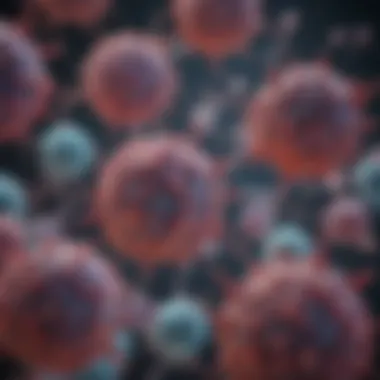Understanding Somatic Tumor Testing in Oncology


Intro
Somatic tumor testing is reshaping the landscape of oncology. This testing technique analyzes genetic changes in the tumor cells of patients. Such insights are pivotal for determining tailored treatment strategies. The relevance of somatic tumor testing extends far beyond basic diagnostics. It contributes significantly to selecting the right medication and monitoring the patient's response to treatment.
As we delve further into the topic, it is essential to understand both the historical and modern contexts that shaped its development. This article aims to break down the complexities surrounding somatic tumor testing. We will address its purpose, explore critical methodologies, and discuss ethical implications.
Article Overview
Purpose of the Article
The primary purpose of this article is to provide a thorough examination of somatic tumor testing. We will analyze its methodologies and the genetic principles behind it. Furthermore, the insights garnered from somatic testing play a crucial role in formulating personalized treatment plans for patients. By emphasizing these points, the article highlights the importance of integrating genetic findings into clinical practice.
Relevance to Multiple Disciplines
Somatic tumor testing is relevant to various fields including oncology, genetics, bioinformatics, and personalized medicine. This interdisciplinary nature broadens its impact, and practitioners from diverse backgrounds can apply its insights in differing ways. For oncologists, understanding tumor genetics can lead to better-targeted therapies. Geneticists can use the data to deepen their understanding of cancer biology. Additionally, those in bioinformatics benefit from refining the analysis methodologies that support tumor testing. This collaborative approach enhances patient care while advancing scientific knowledge.
Research Background
Historical Context
The journey of somatic tumor testing began in the late 20th century. Initially, the focus was primarily on inherited genetic mutations. However, research soon revealed that acquired mutations in somatic cells could also significantly impact cancer pathology. Over the decades, technological advancements in sequencing and genomics improved our ability to identify these mutations accurately. Early tests were limited and often labor-intensive, but recent developments have led to rapid sequencing techniques that allow for broader panels of genetic information.
Key Concepts and Definitions
- Somatic mutations: Changes in DNA that occur in non-germline cells after conception.
- Personalized medicine: A medical model that tailors treatment based on individual patient characteristics, including genetic makeup.
- Genetic testing: Analyzing chromosomes, genes, or proteins to diagnose conditions or assess risk.
Through these key terms, readers will gain a clearer understanding of the concepts integral to somatic tumor testing. These definitions lay the groundwork for further discussions about the testing processes and their implications.
Preamble to Somatic Tumor Testing
Somatic tumor testing plays a crucial role in contemporary oncology. It enables healthcare providers to uncover the genetic mutations that may influence cancer behavior and treatment. The insights gained from these tests lay the groundwork for personalized approaches, emphasizing the unique genetic landscape of individual tumors. This not only enhances treatment efficacy but also minimizes unnecessary side effects associated with ineffective therapies.
Definition and Importance
Somatic tumor testing refers to the analysis of tumor DNA to identify genetic alterations that occur within the cancer cells. Unlike hereditary mutations, which are passed down through generations, somatic mutations arise during a person's lifetime. Understanding these mutations is vital because they can dictate how a tumor grows, spreads, and responds to therapies.
The importance of somatic tumor testing lies in its potential to improve patient outcomes. For instance, targeted therapies are designed to exploit specific genomic alterations, thereby increasing the likelihood of a successful response. Furthermore, the ability to monitor changes in tumor genetics over the course of treatment provides vital information for adjusting therapeutic strategies in real-time. This adaptability can significantly impact overall survival rates and quality of life for cancer patients.
Historical Context
The journey of somatic tumor testing has evolved significantly since its inception. Early cancer treatments were predominantly one-size-fits-all, often leading to variable outcomes. The advent of molecular biology in the late 20th century paved the way for the discovery of oncogenes and tumor suppressor genes. This pivotal period marked the beginning of a shift towards understanding the genetic basis of cancer.
In the early 2000s, the completion of the Human Genome Project catalyzed advancements in genomic technologies. This monumental achievement provided a comprehensive map of human DNA, allowing researchers and clinicians to identify genetic markers associated with various cancers. By the mid-2010s, next generation sequencing techniques emerged, fundamentally changing the landscape of cancer diagnostics. As the costs of sequencing declined, somatic tumor testing became more accessible, allowing it to be utilized routine in clinical settings. Today, it is an essential component of precision oncology, guiding treatment decisions, and shaping research agendas.
"Somatic mutations are not simply incidental findings; they can provide actionable insights that directly influence therapy choice."
"Somatic mutations are not simply incidental findings; they can provide actionable insights that directly influence therapy choice."
This historical context serves as a reminder that the field of somatic tumor testing is continually evolving, driven by advancements in research, technology, and clinical practice. As we move forward, the integration of somatic tumor testing into routine care serves not only to enhance individual patient care but also to pave the way for future breakthroughs in cancer treatment.
Types of Somatic Mutations
Understanding somatic mutations is essential in grasping the full scope of somatic tumor testing. This section delves into two primary categories of mutations: driver mutations and passenger mutations. Grasping these distinctions can aid in the development of targeted therapies and enhance the precision of treatment strategies in oncology.
Driver vs. Passenger Mutations
Driver mutations are genetic alterations that contribute directly to cancer development and progression. These mutations often confer advantages to tumor cells, enabling them to proliferate uncontrollably. Identifying driver mutations is crucial, as they can reveal potential targets for therapeutic intervention. For example, mutations in genes such as EGFR and KRAS are well-known drivers in certain cancers. By targeting these mutations, oncologists can tailor treatment with specific drugs that directly inhibit the pathways activated by these mutations.
On the other hand, passenger mutations refer to mutations that occur alongside driver mutations but do not contribute to tumor growth. They are often viewed as remnants of genetic instability within the cancer genome. While they may accumulate over time, they do not provide any selective advantage. Understanding the relationship between these two categories is vital, as the presence of passenger mutations may influence responses to treatment but do not necessitate alterations in the therapeutic approach.
Common Mutational Profiles
Different cancers have distinct mutational landscapes. For instance, melanoma often features mutations in the BRAF gene, resulting in the activation of signaling pathways that promote cell survival and proliferation. In contrast, lung adenocarcinoma may present frequent mutations in the EGFR gene and KRAS, leading to different therapeutic strategies focused on these drivers.


Common mutational profiles can be summarized as follows:
- Melanoma: BRAF and NRAS mutations
- Lung Cancer: EGFR, KRAS, and ALK rearrangements
- Colorectal Cancer: APC, KRAS, and TP53 mutations
Researching these profiles can lead to improved diagnostic tools and treatments, underscoring the significant role of somatic mutations in the cancer landscape. By developing a comprehensive understanding of these profiles, healthcare professionals can customize treatment plans based on the specific mutation present in a patient’s tumor, ultimately enhancing patient outcomes.
In summary: Driver mutations play a crucial role in cancer progression, while passenger mutations reflect the genetic alterations that do not influence tumor growth directly. Identifying these mutations aids in crafting tailored treatment options.
In summary: Driver mutations play a crucial role in cancer progression, while passenger mutations reflect the genetic alterations that do not influence tumor growth directly. Identifying these mutations aids in crafting tailored treatment options.
Testing Methodologies
Testing methodologies play a crucial role in somatic tumor testing, serving as the backbone for accuracy and reliability in genetic analysis. These methodologies enable the identification of mutations that contribute to the development and progression of cancer. Understanding these testing techniques is imperative for clinicians and researchers aiming to leverage genetic information for patient care and research.
Each methodology presents unique advantages and limitations that must be considered in the context of clinical applications. Hence, selecting the appropriate testing methodology is key for optimizing patient outcomes and advancing personalized medicine.
Next Generation Sequencing (NGS)
Next Generation Sequencing (NGS) is a revolutionary technology that has transformed somatic tumor testing. This methodology allows for the simultaneous sequencing of multiple genes, providing a comprehensive view of the tumor's genetic landscape. NGS offers high throughput, which significantly reduces the time and cost associated with traditional sequencing methods. The ability to analyze small cellular specimens enhances its utility in oncology, where tumor biopsies can often be limited.
Furthermore, NGS is particularly beneficial for detecting rare mutations. This is essential since some tumors harbor unique genetic alterations that standard tests may not identify. The comprehensive data generated by NGS can guide treatment selection, monitor resistance mechanisms, and inform about the tumor's biological behavior.
Polymerase Chain Reaction (PCR)
Polymerase Chain Reaction (PCR) is another cornerstone technique used in somatic tumor testing. PCR is valued for its sensitivity and specificity in amplifying target DNA sequences. It enables the detection of specific mutations within a broader genetic context.
The strength of PCR lies in its capacity to analyze small amounts of DNA with minimal degradation. This is particularly important for samples obtained from formalin-fixed, paraffin-embedded tissues, which are commonly used in clinical settings. PCR is also quick and cost-effective, making it suitable for routine screenings in diagnostics.
However, while PCR is excellent for identifying known mutations, it may fall short in uncovering undiscovered variants. Thus, its use is often complemented by other methodologies like NGS for a more complete analysis.
Fluorescence In Situ Hybridization (FISH)
Fluorescence In Situ Hybridization (FISH) is a technique used to detect and localize specific DNA sequences within chromosomes. FISH allows for the visualization of genetic abnormalities such as translocations, amplifications, or deletions that are critical in cancer diagnostics, especially for certain hematological malignancies.
The methodology offers high specificity, which is crucial for confirming genetic alterations that can influence treatment options. For example, the identification of the Philadelphia chromosome in chronic myeloid leukemia can directly impact therapeutic choices, leading to the use of targeted therapies.
FISH is particularly advantageous in cases where other methods may yield inconclusive results. However, it requires skilled interpretation and may not provide a comprehensive view of all genetic changes within the tumor.
Capillary Electrophoresis
Capillary Electrophoresis is a powerful analytical tool that separates DNA fragments based on size and charge. This technique is often employed in conjunction with PCR to analyze amplified products efficiently.
The strengths of capillary electrophoresis lie in its high resolution and rapid analysis, allowing researchers to separate complex mixtures of DNA. This makes it beneficial for genotyping and for assessing the genetic heterogeneity of tumors.
Despite its advantages, it is important to note that capillary electrophoresis can be limited by its reliance on specific primers and may not be as versatile as NGS. For comprehensive analysis, it must be used with other methodologies to provide a full picture of the tumor's genetic profile.
"A thorough understanding of different testing methodologies is essential for successful somatic tumor testing, influencing both diagnosis and treatment outcomes."
"A thorough understanding of different testing methodologies is essential for successful somatic tumor testing, influencing both diagnosis and treatment outcomes."
Clinical Applications
The clinical applications of somatic tumor testing are essential in modern oncology. By analyzing genetic alterations, healthcare providers can gain valuable insights that shape patient treatment plans and approaches. These applications not only optimize resource use but also enhance patient outcomes by providing tailored therapeutic strategies.
Diagnosis of Malignancies
Somatic tumor testing plays a pivotal role in the diagnosis of malignancies. It helps identify specific genetic mutations associated with various cancer types. Knowing these mutations can lead to early detection and accurate diagnosis. For example, detecting mutations in the EGFR gene can confirm a diagnosis of non-small cell lung cancer, significantly impacting management strategies.
Additionally, somatic testing can facilitate the differentiation of tumors with similar phenotypes. For instance, certain types of breast cancer may present similarly but have distinct genetic profiles, which can guide treatment pathways. The information gained from this testing is crucial. It allows for the selection of targeted therapies that are more effective for specific mutations and minimizes the use of ineffective treatments.
Treatment Decision-Making
In the realm of treatment decision-making, somatic tumor testing is invaluable. Genetic profiles obtained from tumor testing influence the choice of therapies available to patients. This is particularly relevant for targeted therapies that specifically address the underlying genetic dysfunction of the tumor. For instance, patients with HER2-positive breast cancer can receive trastuzumab, which targets this particular mutation.


Furthermore, somatic tumor testing can reveal resistance mutations. Identifying these mutations allows oncologists to alter treatment regimens proactively, which can lead to better patient outcomes. It shifts the treatment approach from a generalized strategy towards a highly personalized one.
Monitoring Treatment Response
Somatic tumor testing is also instrumental in monitoring treatment response. Regular testing can help determine how well a tumor is responding to a prescribed treatment, allowing clinicians to make informed adjustments. For instance, if testing indicates the emergence of new resistant mutations, the treatment plan can be modified to incorporate alternative therapies.
Moreover, monitoring can enable the early detection of relapse. Identifying the molecular signals of recurrence allows for timely therapeutic interventions, significantly improving long-term prognosis. Continuous somatic testing fosters a dynamic treatment landscape where adaptability is crucial for patient survival and quality of life.
"The integration of somatic tumor testing in clinical practice offers nuanced strategies that can profoundly impact patient care."
"The integration of somatic tumor testing in clinical practice offers nuanced strategies that can profoundly impact patient care."
Overall, the clinical applications of somatic tumor testing demonstrate its significance in diagnostics, treatment decision-making, and ongoing monitoring of cancer therapy. As clinical practices evolve, the relevance of this testing will only increase, driving innovations in personalized oncology.
Integration into Precision Medicine
The concept of precision medicine is to customize healthcare, with decisions and treatments tailored to the individual patient. Somatic tumor testing plays a significant role in this approach. It provides genetic information specific to tumors, allowing oncologists to make informed choices regarding therapy. This integration is essential as it fosters a shift from conventional treatment protocols to more personalized strategies that consider one’s unique genetic makeup.
In today's oncology landscape, precision medicine enables targeted therapies. These treatments focus on the specific mutations driving cancer in a patient’s tumor. Here are some key benefits and considerations:
- Enhanced Efficacy: By understanding the genetic alterations in tumors, clinicians can choose therapies that specifically target those mutations. This can lead to better outcomes compared to standard treatments that may not be effective for everyone.
- Minimized Toxicity: Tailored therapies often result in reduced side effects. Patients receive treatments that are more effective for their cancer type, thus avoiding unnecessary drugs that can cause adverse reactions.
- Informed Clinical Choices: Genetic insights from somatic tumor testing allow healthcare providers to tailor treatment strategies according to the specific tumor profile. This data-driven approach enhances the quality of care.
- Monitoring and Adaptability: With a comprehensive understanding of the tumor’s genetic landscape, oncologists can monitor treatment responses more effectively. Adjustments to treatment can be made based on real-time genetic information.
"Incorporating genetic data into treatment strategies allows for a more nuanced approach to oncology, potentially transforming patient outcomes."
"Incorporating genetic data into treatment strategies allows for a more nuanced approach to oncology, potentially transforming patient outcomes."
The integration of somatic tumor testing into precision medicine is not without challenges. Ethical and logistical issues arise, such as ensuring patient privacy and managing large amounts of data. However, the potential benefits are immense, underscoring the need for ongoing research and development in this field.
Tailored Treatment Plans
Tailored treatment plans emerge from the insights gained through somatic tumor testing. Each patient’s cancer is unique, influenced by specific mutations. By analyzing these mutations, oncologists can develop treatment strategies that are not only targeted but also personalized. This method goes beyond traditional one-size-fits-all approaches.
The formulation of these plans involves several steps:
- Comprehensive Genetic Analysis: When a patient undergoes somatic tumor testing, the tumor’s genetic makeup is analyzed. Specific mutations linked to cancer progression and survival are identified.
- Selecting Targeted Therapies: Based on the genetic markers, appropriate therapies can be selected. For instance, if a tumor presents an EGFR mutation, drugs such as Erlotinib may be recommended.
- Combination Therapies: In some cases, using a combination of targeted therapies can achieve better results. Somatic testing helps identify which drugs will work synergistically for the patient.
- Continuous Monitoring: As treatment progresses, ongoing testing can reveal any new mutations that arise. Alterations may require adjustments in the treatment plan to enhance effectiveness.
Elimination of Trial and Error in Oncology
Traditional oncology heavily relied on trial and error to find effective treatments. This approach could lead to delays in effective therapy, often resulting in adverse health outcomes. With somatic tumor testing, this paradigm changes significantly.
Testing helps eliminate much of the guesswork by providing actionable insights. By identifying specific genetic mutations, healthcare providers can:
- Prioritize Effective Therapies: Instead of starting with various treatment regimens that may not be suitable, clinicians can prioritize therapies known to target specific mutations.
- Reduce Time to Treatment: Faster identification of appropriate therapies means that patients can begin effective treatment sooner.
- Improve Overall Survival Rates: With more precise targeting of therapies, patients often experience better survival outcomes. The focus shifts from managing side effects and response failures to achieving therapeutic success.
The transition to a more data-driven approach fosters a more efficient healthcare process. As more practitioners adopt somatic tumor testing into their workflows, the hope is to standardize this practice across oncology, ultimately benefiting patients and improving care quality.
Ethical Considerations
The field of somatic tumor testing touches a wide range of ethical concerns that are critical for both practitioners and patients. As advancements in genomics and molecular technologies continue to evolve, it becomes necessary to address these issues thoroughly. Ethical considerations in this realm not only shape clinical practice but also influence public perception and acceptance of genetic testing.
Privacy and Data Management
Privacy is paramount in somatic tumor testing. Patients provide sensitive information regarding their genetic makeup, which raises concerns about how this data is stored, shared, and utilized. Medical professionals must adhere to strict data protection standards, ensuring confidentiality and security of patient information.
- Data Security Standards: Institutions must implement robust information security protocols to safeguard genetic data from breaches. Investing in advanced cybersecurity measures is crucial.
- Patient Access to Data: Patients should have the right to access their genetic information. Providing them with insights regarding who has access to their data reinforces trust in healthcare providers.
- Third-Party Sharing: Any third-party access to genetic data should be transparent and governed by clear agreements. Patients must be informed if their data will be used for research or commercial purposes.
"The ethical landscape of somatic tumor testing is often navigated through care and respect for patient autonomy."
"The ethical landscape of somatic tumor testing is often navigated through care and respect for patient autonomy."
Informed Consent in Genetic Testing
Informed consent is a fundamental component of ethical medical practice, especially in somatic tumor testing. Patients should be thoroughly educated about the implications of genetic testing before proceeding.


- Comprehension of Risks and Benefits: Healthcare providers must ensure that patients understand the potential outcomes of testing, including the risks of discovering unexpected information.
- Voluntary Participation: It is essential that patients feel free to make their decision without coercion. Consent must be given freely with a full understanding of what is at stake.
- Future Use of Samples: Patients should know what happens to their genetic samples after testing. Plans for future research or potential uses of their data need to be expressly stated during the consent process.
Challenges in Somatic Tumor Testing
Somatic tumor testing has immense potential in guiding cancer therapies, but it comes with numerous challenges that impact its effectiveness and acceptance in clinical practice. Understanding these challenges can help caregivers, researchers, and patients navigate the complexities of this evolving field. The importance of addressing various challenges is not only vital for improving diagnostic accuracy but also for ensuring successful patient outcomes.
Technical Limitations
Technical limitations present notable obstacles in somatic tumor testing. One significant issue is the quality of the sample obtained. Tumor samples may be heterogeneous, meaning they include different types of cells with distinct genetic mutations. This variability can lead to incomplete profiling that ultimately misguides treatment decisions.
Another limitation is the sensitivity of testing methods. Not all tests are equally capable of detecting low-frequency mutations. Next Generation Sequencing (NGS), while powerful, can sometimes miss alterations present in minority cell populations. The accuracy of PCR or FISH lies in their ability to detect specific mutations, but they may not provide a comprehensive genomic profile.
Moreover, discrepancies in laboratory specifications and methodologies further complicate results. Different labs may employ unique protocols, leading to variations in results and interpretations.
- Key technical limitations include:
- Sample quality and heterogeneity.
- Sensitivity of detection methods.
- Lack of standardization across laboratories.
Interpretative Complexity of Results
The interpretative complexity of results from somatic tumor testing is another significant challenge. The vast amount of data generated can be overwhelming. Genetic mutations are not uniformly understood; some may be classified as drivers that contribute to cancer progression, while others may be deemed benign or of uncertain significance. This classification ambiguity complicates clinical decision-making.
Physicians and oncologists often face difficulties in interpreting variant pathogenicity. The challenge lies in differentiating clinically relevant mutations from those that do not impact treatment decisions. Furthermore, the evolving understanding of genomics means that a mutation considered non-contributory today might gain relevance with future research.
Consequently, there is a pressing need for standardized guidelines in the interpretation of genomic data. Continuous education and collaborative efforts among geneticists, pathologists, and oncologists become essential to bridge the gap in understanding.
"Effective interpretation of somatic mutations requires not just data but also a nuanced understanding of their clinical implications."
"Effective interpretation of somatic mutations requires not just data but also a nuanced understanding of their clinical implications."
Addressing challenges like technical limitations and interpretative complexities is crucial. It helps to enhance the precision of cancer treatments and ultimately improves clinical outcomes. Institutions must prioritize ongoing education, rigorous research, and collaboration to overcome these hurdles, ensuring patients receive the most effective interventions based on accurate genomic insights.
Future Directions
Future directions in somatic tumor testing are crucial for expanding the scope and efficacy of cancer treatment. As the field continues to evolve, it is essential to explore the technological advancements and the potential for comprehensive genomic profiling that can significantly enhance patient outcomes.
Advancements in Technology
Technological progress in somatic tumor testing is accelerating. One key area of development is the refinement of next-generation sequencing (NGS). NGS has revolutionized how we detect and analyze genetic mutations in tumors. Improved algorithms and increased throughput allow for faster and more accurate readings. Moreover, liquid biopsies are emerging, offering the possibility to detect tumor DNA in a non-invasive manner. This means that patients may not need invasive surgical biopsies for accurate testing.
Advancements also include enhanced bioinformatics tools. These tools aid in analyzing complex genomic data, allowing clinicians to interpret results with greater clarity. Furthermore, artificial intelligence is being integrated into the testing process, providing predictive analytics that assist in forecasting treatment responses and disease progression. Such technologies hold the promise to streamline workflows and elevate the precision of diagnosis and treatment recommendations.
Potential for Comprehensive Genomic Profiling
Comprehensive genomic profiling is another significant future direction. This involves analyzing the entire genomic landscape of tumors rather than focusing on specific mutations. Such an approach can uncover actionable mutations that may not be apparent through traditional testing methods. With comprehensive profiling, oncologists can craft personalized treatment plans that target multiple pathways involved in cancer progression.
The potential for this technique is immense. By using genomic profiling, it is possible to identify not just the genetic drivers of metastatic disease but also the resistance mechanisms that tumors develop against therapies. This understanding can lead to novel treatment strategies that are more effective, limiting the reliance on standard one-size-fits-all protocols.
In addition to improving treatment efficacy, comprehensive genomic profiling can facilitate clinical trial matching for patients. With precise identification of relevant mutations, patients can be matched with trials testing new drugs or therapies catering specifically to their tumor's genetic profile. This increases the likelihood of successful outcomes and contributes to the body of knowledge about various cancers.
"The future of somatic tumor testing lies in integrating advanced technology with comprehensive approaches, setting the stage for more effective and personalized care."
"The future of somatic tumor testing lies in integrating advanced technology with comprehensive approaches, setting the stage for more effective and personalized care."
In summary, as somatic tumor testing progresses, innovations in technology and comprehensive genomic profiling will play key roles in enhancing precision medicine in oncology. These trends represent a path toward more individualized and effective cancer treatment strategies.
Finale
The conclusion of the article synthesizes the key elements of somatic tumor testing, emphasizing its vital role in the emerging landscape of oncology. This cutting-edge approach not only enhances the precision of diagnosis but also tailors individualized treatment plans that significantly improve patient outcomes. As the preceding sections have outlined, somatic tumor testing relies on an array of methodologies such as Next Generation Sequencing and PCR, which have transformed the way oncologists understand and approach cancer treatment.
In this overview, we have discussed how somatic tumor testing can eliminate the traditional trial and error methods seen in many oncology practices. The precision afforded by this testing allows healthcare professionals to make well-informed decisions based on the unique genetic makeup of tumors, thereby optimizing therapeutic strategies. Furthermore, integrating this into broader precision medicine practices enhances the ability to monitor treatment responses effectively and adjust therapies accordingly.
Summary of Key Points
- Defining Somatic Tumor Testing: As an essential tool, somatic tumor testing provides insights that guide treatment decisions.
- Historical Developments: It is important to acknowledge the evolution of this field, which has been marked by significant technological advancements.
- Methodologies: Different testing methods, including NGS and PCR, have diverse applications and contribute valuable data.
- Challenges: While the benefits are substantial, there are still technical limitations and complexity in interpreting results that need addressing.
- Ethical Considerations: Ongoing dialogue around privacy, consent, and data management underscores the importance of ethical stability.
- Future Outlook: There is significant potential for advancements in technology and comprehensive profiling.
The Path Ahead for Somatic Tumor Testing
Looking forward, the trajectory of somatic tumor testing appears promising. Advances in technologies such as artificial intelligence and machine learning hold the potential to enhance the speed and accuracy of genetic analysis. Concurrently, there is a movement towards comprehensive genomic profiling, which aims to capture a broader range of genetic alterations in tumors. This progression can pave the way for more nuanced approaches to treatment, making it essential to invest in research and development.
Moreover, collaboration between researchers, clinicians, and ethicists will be paramount in navigating future challenges and opportunities. As this field matures, ensuring patient-centered care while addressing ethical dilemmas will be critical for sustainable advancement. Ultimately, the journey of somatic tumor testing is as important as its destination, marking a significant paradigm shift in cancer care and research.



